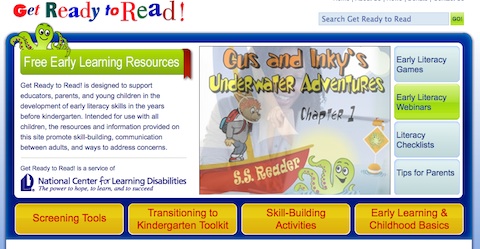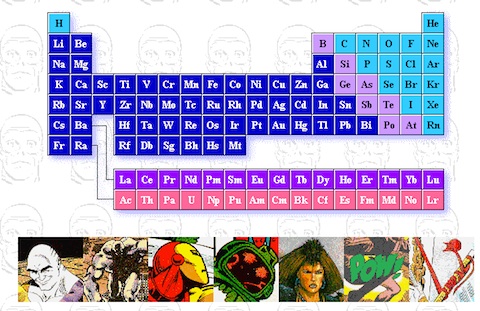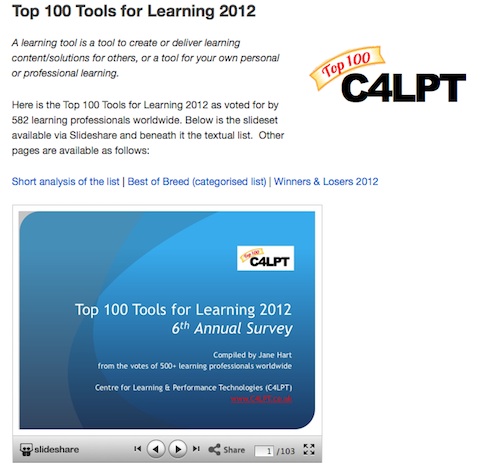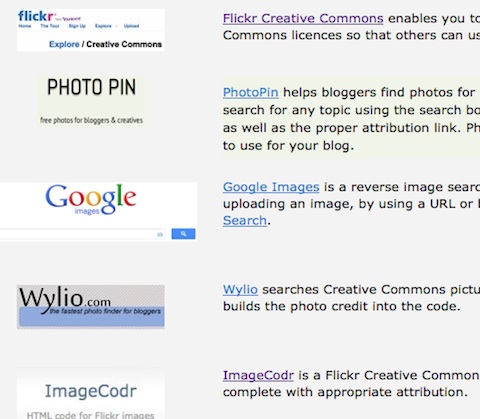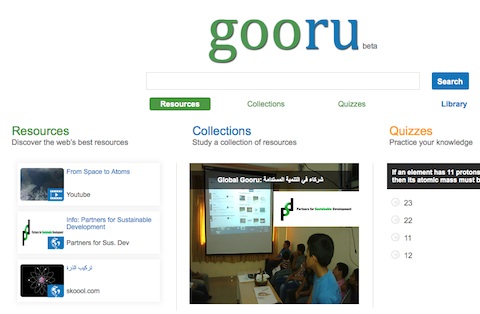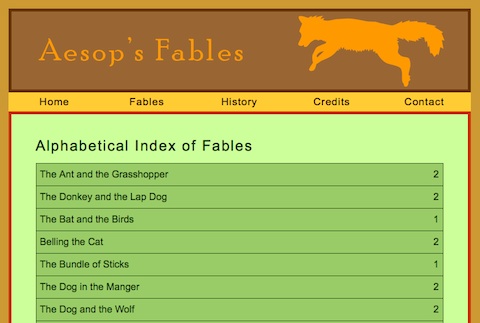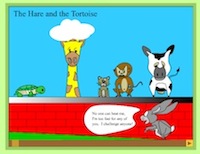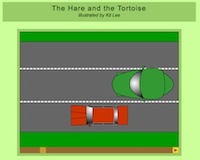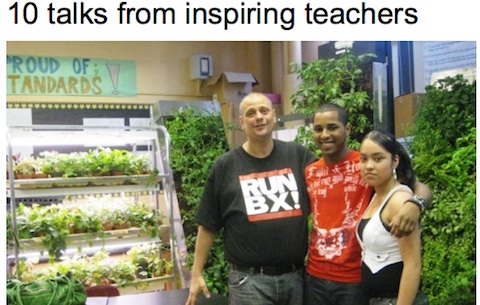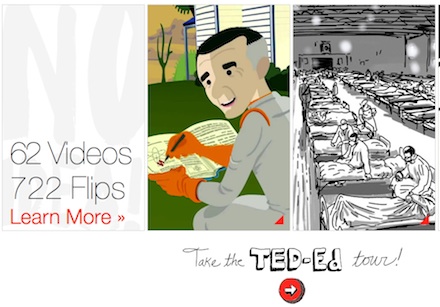Although this site is mainly for parents and teachers of preschool age children, it would also be invaluable for teachers of students with learning difficulties. The activity cards for pre-reading awareness are delightful, with very creative ideas for making things to promote a desire to read or understand the purpose and need for text. (Also useful for a grandmother’s toolkit!)
Category Archives: Teaching & Learning
Learn about the Periodic Table Elements the ‘comic book’ way
Best tools for learning – 2012
Video Dictionary – adds meaning to words!
One of our teachers is working with hearing impaired students and this will be of great interest to her students. Embedded into a Moodle lesson, students would have a relevant visual starting point. Clearly this site is being developed and we will watch with interest to see its final scope. The possibilities are enormous.
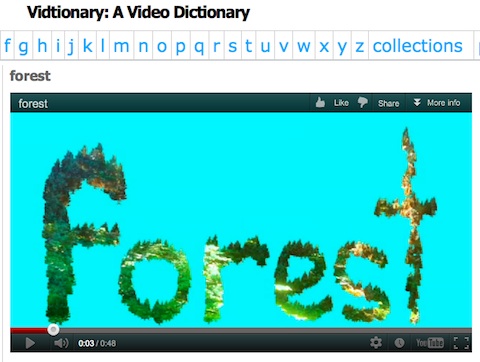
Ashley describes her ‘Hundred Acre Wood’ Characters
100 Acre Wood from Alinda Sheerman on Vimeo.
The One Hundred Acre Wood – 2B learns about relationships
Towards the end of last year and with a focus on the coming National Year of Reading class teacher, Kate Bradley, drew on A. A. Milne’s timeless classic Winnie-the-Pooh to help her class learn about relationships and also to use this literature to bind subject areas into an integrated unit of work. The students read the book then created their own characters who had to live together in their own class One Hundred Acre Wood behind the IRC. Students visited their ‘Wood’ often -sometimes bringing down their writing materials and working outside for added inspiration. This became their presentation area with characters (plastic bottles) standing next to poetry compositions (laminated on sticks). The display became a collaborative effort between the classroom teacher and Teacher Librarian with some Senior Students also assisting during study periods and the students benefited from all the added attention! In the following video Kate describes this unit of work.
Permission Needed for Images on your blog
Read a timely reminder posted by Ronnie Burt today: PSA: Don’t Let Salami and Google Images Get You In Hot Water
Google Advanced Search indicates which images have a Creative Commons license to republish online.
http://www.google.com/advanced_image_search
Flikr Images also have a Creative Commons search option.
Gooru – A search engine specifically for Learning
This site links to many online educational resources available for Science and Maths at Secondary level. As it develops it is set to become to become a starting point for students to discover resources of all types and all subject areas in the one place – specific to their educational needs.
Teachers and students can use Gooru to search for rich collections of multimedia resources, digital textbooks, videos, games and quizzes created by educators in the Gooru community.Gooru is free (of cost and ads) and developed by a 501(c)(3) non-profit organization whose mission is to honor the human right to education.
Aesop’s Fables: Digital presentations
Ten inspiring teachers share in TED talks
The TED Blog informs us about, and links to, ten inspiring ‘Talks’ by teachers from many areas of school education.
Arthur Benjamin: Teach statistics before calculus
John Hunter: Teaching the World Peace Game
Emily Pilloton: Teaching design for change
Dan Meyer: Math class needs a makeover
Aaron Sams: How to speed up chemical reactions and get a date
Sugata Mitra: The child-driven education
Liz Coleman: a call to reinvent liberal arts education
Conrad Wolfram: Teaching kids real math with computers
Clifford Stoll: The call to learn
Technology forecasts – changes to teaching and learning
This chart, by the United States Department of Labor Futurework, graphically illustrates where we might be heading over the next thirty years based on the rapid changes in technology today. A conclusion is reached: “Fifty percent of today’s grade school kids will end up at jobs that haven’t been invented yet.” Clearly we must be training students to be creative and inventive.
This is where Guided Inquiry, used at Broughton in many classes, trains students to pose deep, personal questions, discover, select and channel information from many sources to reach conclusions that assist in bringing about change.
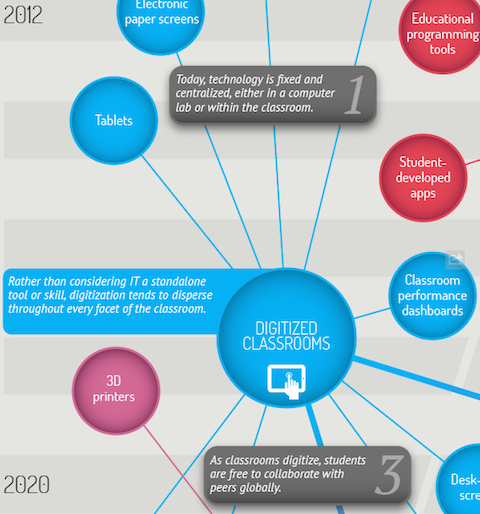
Whilst we’re learning from Will Richardson… more from TED Talks
I came across this TED talk today – more inspirational aspects of teaching to the needs and relevancy of today’s children.
Will Richardson urges teachers to make learning relevant and encourages a global focus
A few years ago I heard Will Richardson speak at a conference in Sydney. He was inspirational in how he challenged us to use the available technologies to make changes in education. In particular he showed us how to use technology to encourage a global perspective for learning. We were encouraged to blog our own learning and share widely.
In the following video clip, recorded at the ISTE 2012 conference, he says that teachers should allow students to be learners who are able to pursue personal interests and passions, “Don’t do work that just exists within your classroom and gets pushed onto classroom walls, do work that changes the world… Kids can create things that impact people around the world…Why wouldn’t we do that…Why wouldn’t we publish their work…”
This term, Year 10 Commerce students begin a Guided Inquiry unit of work. They have the choice to follow their passions in researching Issues in Australian Society. The culmination of their study is to propose ways that they could initiate change. This is the third year that Guided Inquiry has been used for this unit of work – with a team teaching approach by the class teacher and the Teacher Librarian. The 2010 Action Research project, looking into Year 10 Commerce and their use of Guided Inquiry, can be found in the top bar of this blog. The students were keen to share their work.
This video was found at:
http://plpnetwork.com/2012/07/17/richardsons-19-bold-ideas-change/
Tools to keep your brain active
Here is a list of 43 tools and activities for students – to make learning fun at the same time as exercising your brain!
Cool Tools to Engage Your Brain over the Summer curated by Lisa Johnson provides activities from across most KLAs with a bent towards K-6 students but with many applications for older students as well.

TED-Ed: Turn a video into a lesson… and share
Early in March the new video channel TED-Ed was introduced. The platform is now more than just a repository.
Within the growing TED-Ed video library, you will find carefully curated educational videos, many of which represent collaborations between talented educators and animators nominated through the TED-Ed platform. This platform also allows users to take any useful educational video, not just TED’s, and easily create a customized lesson around the video.
This facilitates a new trend called “Flip Teaching” where students watch a prepared video lesson at home and class time is devoted to discussion, building ideas and creative responses.
TED-Ed enables shared lessons via Twitter, Facebook or email with the ability to check who has viewed your lesson and how they progressed in any activities within the lesson – with their permission.

